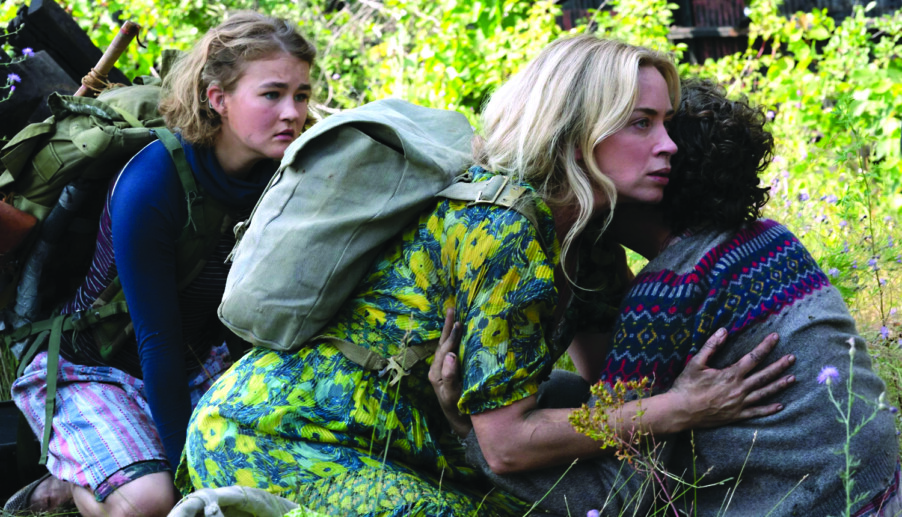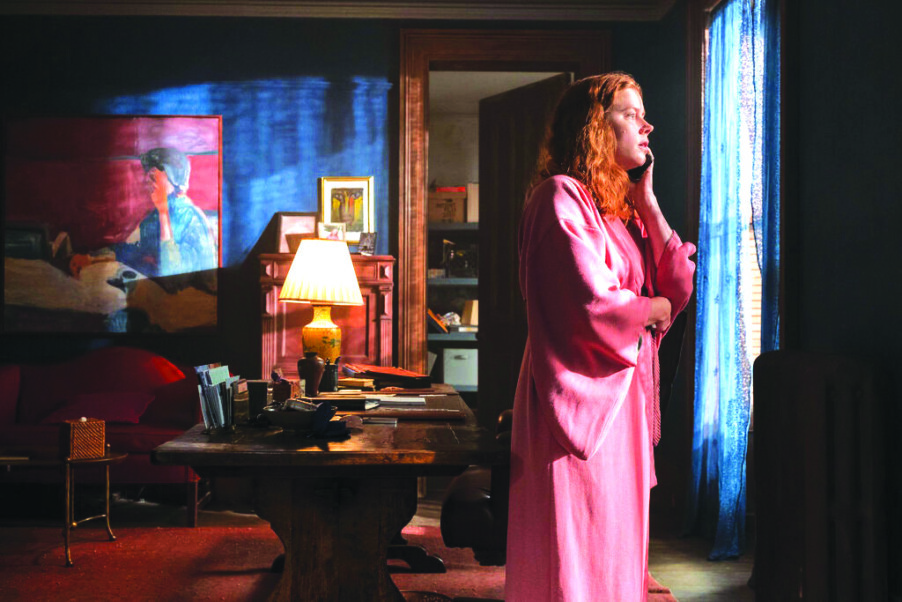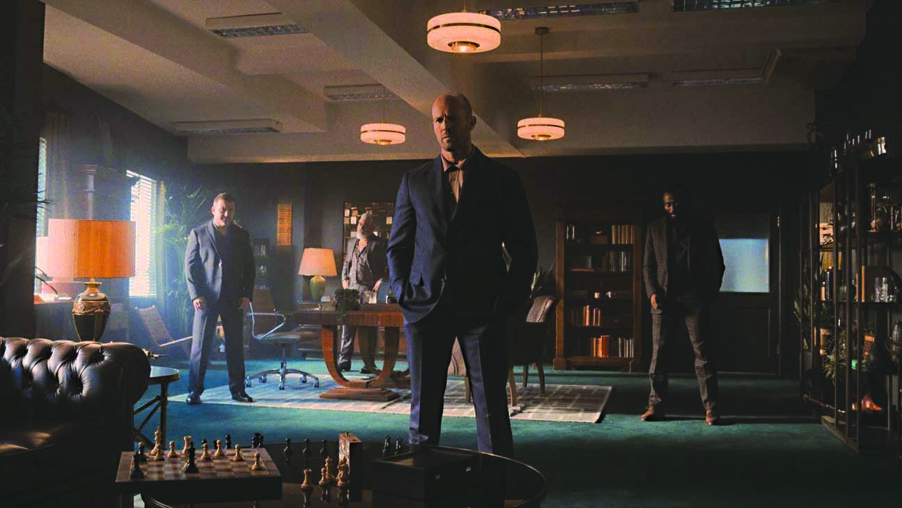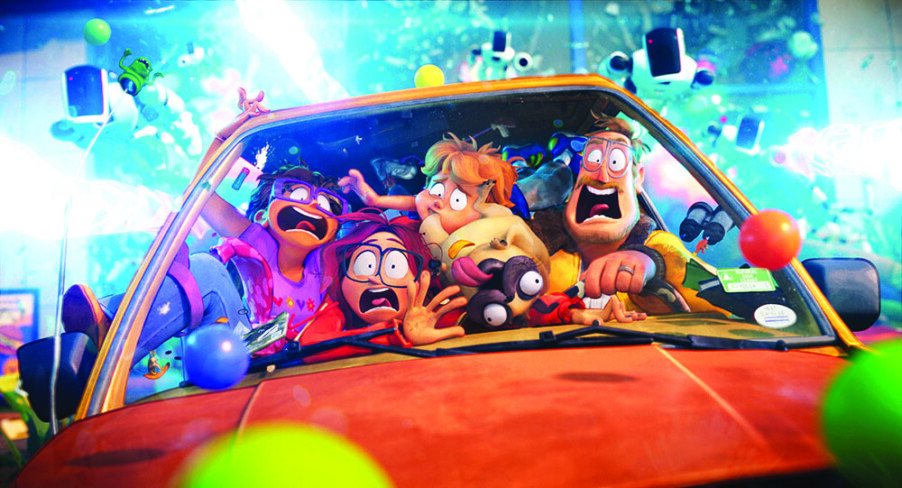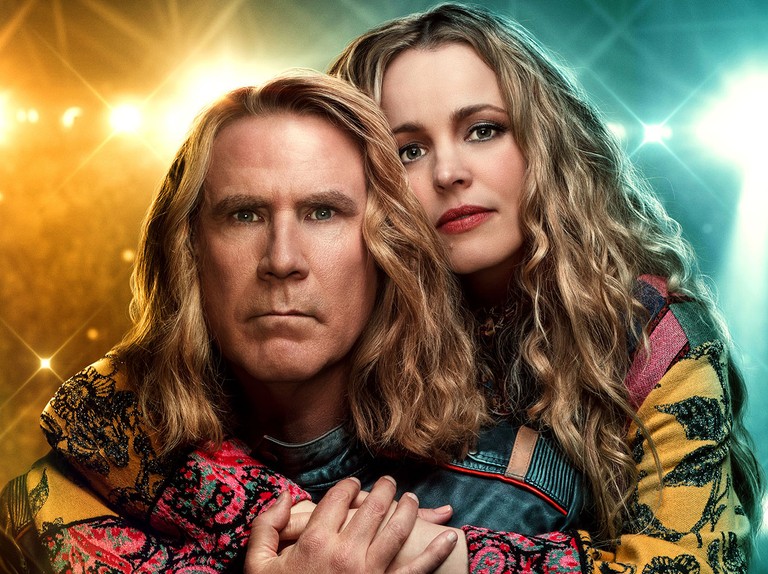A Quiet Place Part II (PG-13)
The soft-steps-and-muffled-screams family from the first movie must seek a new safe haven in A Quiet Place Part II, the sequel to the 2018 horror sci-fi which is screening only in theaters.
After looking back at Day 1 of the invasion of the sound-sensitive giant-stick-insect-y aliens, the movie picks up right where the first one left off, with father Lee (John Krasinski, also the movie’s director) dead, and recently postpartum mother Evelyn (Emily Blunt) caring for her newborn and fleeing their burning home with her tween-maybe son Marcus (Noah Jupe) and oldest (I think) child, teen Regan (Millicent Simmonds). Regan holds the key to the discovery made at the end of the last movie, which is that her hearing aid, when put next to a microphone, creates a feedback noise that incapacitates the aliens (who hunt humans using sound, thus the constant need for quiet) and leaves them vulnerable to being shot or otherwise destroyed.
The family heads out, eventually meeting up with Emmett (Cillian Murphy), a friend from before (whom we see in the Day 1 scenes) at a factory that offers some protection in various underground soundproof-ish rooms. He is grizzled and broken and not eager for houseguests, but he takes pity on the whole new baby situation and lets them stay. To distract an injured Marcus, Regan fiddles with a radio lying around Emmett’s lodgings and happens upon a frequency playing “Beyond the Sea” in a loop. Excited about the possibility of other people somewhere in the world and a means of broadcasting the alien-defeating sound, Regan starts to form a plan about how to find the radio station. Meanwhile, Evelyn is busy tending to Marcus and trying to figure out how to keep her baby alive with the small oxygen tank and soundproof bassinet that the family constructed.
Eventually, we get two and sometimes three groupings of characters, facing various dangers on their assorted missions. Even more than in the last movie, Regan becomes the core of the movie here — she is the one thinking of the future when the adults around her are just surviving in the moment.
Part II does many of the same things the first movie did in terms of building suspense, creating terror in small moments and making the emotions of family and parenting part of the fabric of what’s happening. It is, like, 80, maybe 85 percent as successful as the first movie at doing all of this in a way that grabs you and keeps you locked in to the action. I think. I’ll admit that (based on a reread of my review of the first movie) I didn’t find this movie as thoroughly engrossing and entertaining as the last one, but then context is everything. Are the little imperfections here (there is some pretty heavy underlining of plot points; I found myself wondering more about the rules of these aliens than I did in the last movie) more apparent than in the last movie, or am I just in a place where a family surviving worldwide catastrophe is not as much of a fun time at the movies?
All that said, the performances are solid all around. Blunt is really skilled at being this kind of action hero, at blending the emotion of the story with the physicality of whatever struggle her character is dealing with. It gives heft to the role. Simmonds and Murphy do good work, having good fatherly-daughterly chemistry in the part of the story line that puts them together.
I think even if A Quiet Place Part II doesn’t sound like it’s for you right now, it’s worth catching up with at some point if you enjoyed the first movie. B
Rated PG-13 for terror, violence and bloody/disturbing images, according to the MPA on filmratings.com. Directed by John Krasinski with a screenplay by Krasinski, A Quiet Place Part II is an hour and 37 minutes long and distributed by Paramount Pictures.
Cruella (PG-13)
Emma Thompson is having a blast, so that’s at least something, in Cruella, the more than two-hour-long Cruella de Vil origin story newly out in theaters and on Disney+.
As a child, little Estella (Tipper Seifert-Cleveland) already had that black-and-white-cookie hairstyle and a feisty nature that made her a fighter when bullies inevitably picked on her. But she had a strong sense of self, a good friend in a young girl named Anita (Florisa Kamara) and a staunchly supportive mother (Emily Beecham).
Tragedy landed Estella alone in London, where she met the young grifters Jasper (Ziggy Gardner) and Horace (Joseph MacDonald). Together with their dogs Buddy and Wink, they create a sort of found family that continues to work together, picking pockets and committing petty thefts, until Estella is Emma Stone aged. But grown-up Jasper (Joel Fry) and Horace (Paul Walter Hauser) can see that Estella still dreams of something more for her life, something of the glamour and fashion she loved so much in her youth. They finagle a spot for her at a posh department store, which helps her get a job for the respected and feared fashion designer The Baroness (Emma Thompson). The Baroness is the top of the heap of the London fashion scene and Estella is at first delighted to work for her. But the more she learns about the Baroness, the more she finds herself harboring thoughts of domination and revenge.
Enter Cruella.
Cruella is what Estella’s mother called her naughtier impulses during her childhood and, after trying so hard to keep a rein on her love of mayhem (most visible in her dying of her hair one solid color), Estella decides to let her hair return to its natural state and let Cruella take the wheel.
With the general meanness of Cruella (saying genuinely mean things to her found family, for example) and all the talk of murder, this is not a kid-friendly movie, in the elementary-school sense of kid. And that’s fine —not everything has to be for everybody. But I did find myself wondering who this movie is for. (I mean, who are any of these live-action Disney movies for other than the studio executives who hope that the combination of known intellectual property and bankable stars equals money and just keep tossing the dice on these things no matter how much they seem like “meh” ideas from the get-go.)
Even so, 90 minutes of this movie, 90 minutes that leaned into the movie’s best elements, would be fine. Thompson is snarling and hissing and just having a great time being a baddie, and that by itself can be a joy to behold. The costumes are awesome — I love the Baroness’s classy looks and Cruella’s punk-er takes. The soundtrack uses some of the best 1960s and 1970s music that money can buy the rights to. That’s all fun. Throw in some heisting and some good business from Stone (she has her moments here, even if it feels like the costumes are frequently driving her performance) and you’ve got a fun if forgettable movie.
But Cruella feels like it goes on forever, without adding much to whatever this movie is trying to do with the character (Maleficent her, I’d imagine, so they can wring a Part II out of this story). She’s not the Disney Harley Quinn (which is how it sometimes feels like she’s being positioned), spunky even in her villainy. She’s not really misunderstood —she’s a jerk, on purpose, because she likes it for a lot of the movie, which doesn’t make her the wronged anti-hero I feel like the movie sometimes wants to paint her as. She’s just, well, a cartoon villain, who, like many a Disney villain, is most interesting in her wardrobe and one-liners, but that doesn’t feel like enough to sustain two hours and 14 minutes. C+
Rated PG-13 for some violence and thematic elements, according to the MPA on filmratings.com. Directed by Craig Gillespie with a screenplay by Dana Fox and Tony McNamara, Cruella is two hours and 14 minutes long and is distributed by Walt Disney via Disney+ (for $29.99) and in theaters.
Plan B (TV-MA)
High school best friends hit the road in search of the morning-after pill in Plan B, a movie directed by Natalie Morales.
Diligent student Sunny (Kuhoo Verma) is supposed to spend the weekend studying, but when her mom Rosie (Jolly Abraham) goes out of town, Sunny’s best friend, Lupe (Victoria Moroles), convinces her to throw a party. The party is your standard high school movie, spur-of-the-moment scheme to allow Sunny to hang out with Hunter (Michael Provost), her longtime crush.
The party does not go as planned — Hunter leaves with another girl, Lupe’s crush Logan never shows and Sunny, sad and tipsy from a horrible punch bowl concoction of wines, pickle juice and cough syrup, ends up having quick, awkward sex with Kyle (Mason Cook), a boy she isn’t really interested in. The next morning she realizes that there was a problem with the condom and is panicked that she’ll get pregnant and prove correct her mother’s assessment that one mistake can destroy your whole life. Don’t worry, Lupe reassures her, you can get the Plan B pill.
As is apparently true in real life South Dakota, where this movie takes place, Sunny can’t get the Plan B pill because the pharmacist at the drugstore declines to give it to her under the “conscience clause.” To the Planned Parenthood!, Sunny decides, except it is three hours away in Rapid City and she technically doesn’t have a car. Thus begins a chain of events — taking her mother’s car, getting lost, a pit stop so Lupe can see Logan — that leads to Sunny deciding whether to take a random pill sold by a random dude who says it’s probably Plan B, maybe speed but almost certainly not PCP.
Not unlike Unpregnant from last year, Plan B mixes comic riffs on road movie and teen movie cliches with sobering moments that make the movie’s point without turning it into an op-ed. And, also as with Unpregnant, the girls’ relationship — its strengths, its weaknesses, what they mean to each other — is the heart of the story. I like the way it shows Sunny and Lupe as close and able to be more than their parents’ expectations or their school selves with each other and yet they still wrestle with things they can’t tell each other. The movie — and the charming performances by Verma and Moroles — makes these two girls full multilayered people, with more to them than just a teen-movie type. B+
Rated TV-MA, according to Hulu. Directed by Natalie Morales with a screenplay by Joshua Levy and Prathiksha Srinivasan, Plan B is an hour and 47 minutes long and is available on Hulu.
Featured photo: A Quiet Place Part II (PG-13)

